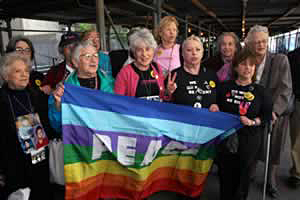OldSpeak
Grannies for Peace
By Neelam Patel
June 30, 2006
On Wednesday, June 28, ten members of the Granny Peace Brigade were arrested in Philadelphia after they refused to leave a military recruiting center. Jean Haskell, a 74-year-old grandmother of five, said, “We’re saying, ‘I’ve lived my life. Let me go to Iraq instead of our children, so they have a chance to live their lives.’” Military officials at the recruiting center had informed the grandmothers and other anti-war protesters who had joined them that they were too old to enlist. Refusing to leave, the protesters were arrested soon after the center was forced to close down early because they were blocking access.
This is not the first time the grandmothers have been arrested. In October 2005, 18 women were arrested for disorderly conduct after they were accused of blocking traffic at the Times Square Army Recruitment Center. A judge later acquitted the protesters, stating that there has been no premise for their arrest.

What started out as anti-war protests among the young and the liberals of our country is quickly spreading to the elderly—particularly grandmothers, who are forming anti-war organizations throughout the country, as well as the world. The Granny Peace Brigade consists of a group of 18 women between the ages of 60 to 91 who oppose the war by attempting to enlist instead of letting young adults sacrifice their lives for President Bush’s agenda. Another organization, Grandmothers for Peace International, started out in 1982 as a protest against American nuclear weapons during the Cold War. However, their work now includes protesting the War in Iraq, as well as nuclear armament, nuclear testing and global militarism. The group has chapters in half the states, as well as England, Germany and South Africa. Grandmothers Against the War, which was founded in 2003 and is affiliated with Grandmothers for Peace International, holds a peace vigil every Wednesday in front of Rockefeller Center to demand the immediate withdrawal of troops from Iraq. Another group, CODEPINK, is a grassroots movement working toward ending the War in Iraq, preventing new wars and allocating the resources away from war efforts toward healthcare, education and other social welfare policies. On July 4th, CODEPINK will launch a hunger strike in Washington, D.C. called Troops Home Fast in front of the White House.
While our congressional representatives and the leaders of our government continue to spend billions of dollars in Iraq, it’s refreshing to see Americans who are willing to actively carry out their resistance, rather than remain passive. During the time of their lives when they would normally be at home baking cookies and working in the garden, elderly women are taking a stand. Not afraid to be arrested, these women are doctors, lawyers, teachers, architects, singers and social workers. With the majority of Americans working 9-5 jobs and unable to go into the streets to voice their opinions, the grandmothers are urging all grandmothers who have the time and the energy to join their cause.
Society usually expects the younger generation to cause an uproar about social concerns such as war. But this time, the tables have turned. The older generation is taking the driver’s seat and encouraging the rest of the country to participate in holding the government accountable to the people.
DISCLAIMER: THE VIEWS AND OPINIONS EXPRESSED IN OLDSPEAK ARE NOT NECESSARILY THOSE OF THE RUTHERFORD INSTITUTE.


